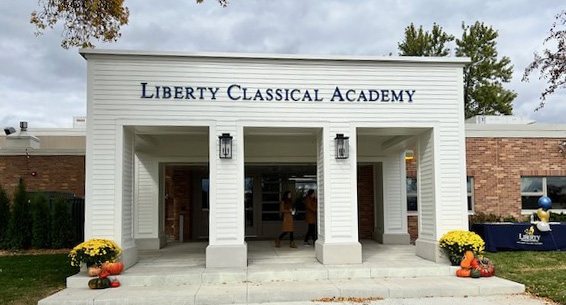Liberty Classical Academy officials have filed suit in U.S. District Court against May Township in their bid to begin construction of the school’s planned expansion as soon as possible.
Officials from the Hugo school filed a demand for a jury trial in the civil case, claiming that May Township officials’ decision to enact a moratorium on “schools and facilities associated with schools” was arbitrary.
The May Town Board voted in August to deny Liberty Classical Academy’s request for a conditional-use permit for a sewage treatment system and stormwater management facilities that are proposed to be located on school property in the township.
The private Christian academy, which serves students pre-K through 12th grade, moved part of its lower-school programming two years ago to the former Withrow Elementary School building in neighboring Hugo. School officials also bought the neighboring 88-acre Zahler farm, which is located in Hugo and May Township.
Liberty officials want to build an approximately 33,500-square-foot building addition to the existing school and associated parking on the Withrow property. The Hugo City Council in June approved the expansion plans, which will effectively double the size of the school building.
But May Township officials, in a 2-0 vote, denied the academy’s CUP request “on the basis that it is inconsistent with the terms of a recently passed interim ordinance establishing a moratorium around non-residential, commercial and institutional type uses in the rural residential district,” Town Board Chairman John Pazlar said at the time.
The vote was 2-0 because town board supervisor Don Rolf abstained. Rolf is an employee of Pope Design Group, the architecture firm assisting the school with the building plans.
Liberty officials claim in the complaint that township officials waited “until seven days before (they were) required to vote on the school’s conditional-use permit, even though the Town of May had been aware of (school’s) plan for over two years,” the complaint states.
Liberty officials also allege in the complaint that: the township’s “denial of the school’s CUP application was illegal because the moratorium is invalid,” the township violated the Religious Land Use and Institutionalized Persons Act, which protects faith organizations from zoning laws that substantially burden religious exercise, and the township violated the First Amendment by denying the school’s “community’s rights to speech and assembly because it prevents (Liberty) from developing its independent, permanent location notwithstanding the CUP’s application with Town of May’s Code.”
Rebekah Hagstrom, the academy’s headmaster and founder, said Tuesday that she could not comment on the merits of the case.
“The goal of the litigation is to enforce Liberty Classical Academy’s property rights against an arbitrary moratorium,” she said. “This litigation is aimed at correcting procedures, not quarreling with the people of May Township. We look forward to working with the Town of May to resolve the issue quickly.”
Pazlar said the township recently received Liberty Classical Academy’s formal complaint filing, and town staff are in the process of reviewing it “with the intent of responding to this issue in a timely and comprehensive manner.”
Given the pending litigation, he said he could not comment further.
Neighbors who live in the area told the Pioneer Press in July that they were worried about the school’s plans for future expansion, citing concerns about an increase in traffic and its proposed subsurface sewage treatment system.
Jim Dropps, who lives just west of the site, said Tuesday that the project does not meet May Township’s rural-residential zoning requirements.
“That’s the primary issue,” he said. “Institutional uses are not allowed, and any CUP has to ‘ensure that the rural residential character of the community is preserved, by limiting the (conditional) uses to a secondary role.’”
“The fact that the project doesn’t meet these requirements was the basis for the moratorium,” Dropps added. “Liberty’s attempt to make this about religion or the First Amendment distracts from the fact that schools and other institutional uses are not allowed in the rural-residential zoning districts’s comprehensive plan.”


Leave a Reply